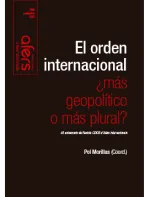The networked power of urban diplomacy in global governance

Cathryn Clüver Ashbrook, Senior Advisor, Program Europe's Future, Bertelsmann Stiftung. cathryn.cluever.ashbrook@bertelsmann-stiftung.de.ORCID: https://orcid.org/0009-0008-8610-0470
The network structures that have arisen out of globalisation could provide an alternative means of addressing major global challenges (climate change, mitigation of its effects or the prevention of pandemics). Cities increasingly consider themselves “actors motivated by interests” and they turn to urban diplomacy and interest-based networks to change the conversation – and, ultimately, the power structure – of multinational governance. Starting with a definition of what urban power is, this paper examines the rise of urban networks and their leverage of data to claim a more active role in the face of their nation-states, and on a global scale. Drawing on two brief case studies – the C40 network and Voluntary Local Reviews – it points to possible ways forward for urban influence networks in the near-term future
Key words: cities, networks, globalisation, networked power, urban networks, climate change
This article is adapted from "Metrodiplomacy: How Digital Connectivity Can Expand the Power of Urban Influence", Data in International Relations, Bjola, C. and Kornprobst, M. (eds.) Routledge, (London, 2023), forthcoming.
How to cite this article: Clüver Ashbrook, Cathryn. «El poder en red de la diplomacia urbana en la gobernanza mundial». Revista CIDOB d’Afers Internacionals, n.º 134 (septiembre de 2023), p. 131-148. DOI: doi.org/10.24241/rcai.2023.134.2.131
Revista CIDOB d’Afers Internacionals, n.º 134, p. 131-148
Quadrimestral (May-September 2023)
ISSN:1133-6595 | E-ISSN:2013-035X
DOI: https://doi.org/10.24241/rcai.2023.134.2.131
>> The full text articles are available in Spanish language